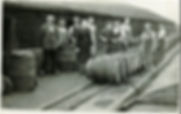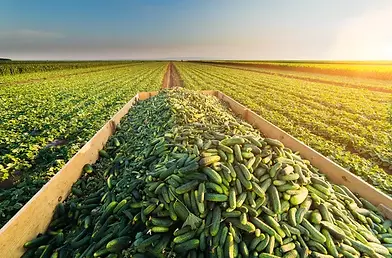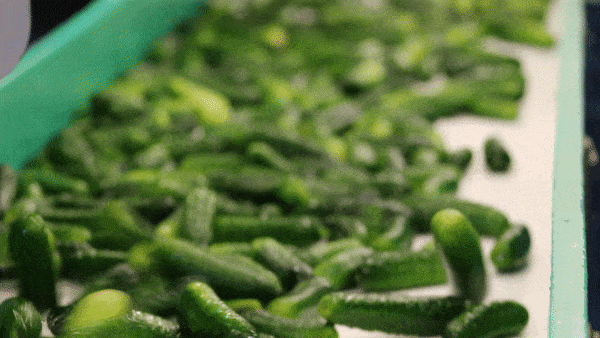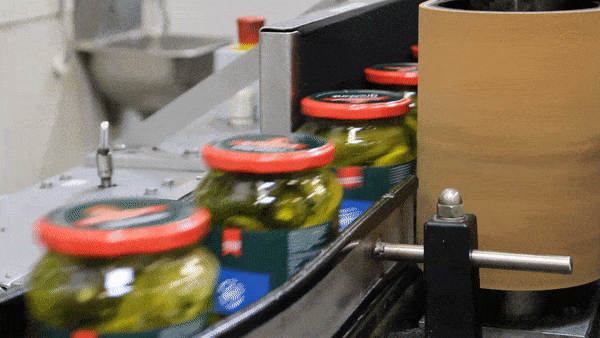

SINCE 1947
The story of the nation’s #1 gherkin started in 1947, when the first Mrs Elswood gherkins were brought into the UK from the Netherlands on a bi-plane!
Over the years we’ve concentrated on pickling the finest gherkins and pickled vegetables, and our recipes are a closely kept secret.

FARM TO JAR FOR CRUNCH

Originally, gherkins were packed into wooden barrels where they were left to ferment over time. Stores would open the barrel and shoppers would scoop out the gherkins to take home.
Nowadays, Mrs Elswood gherkins are picked fresh from the farm, then packed and pickled directly in the jar - straight after harvest. We do this to retain the freshness and crunch of a freshly picked cucumber.

THE PERFECT GHERKIN
GERMINATION
To germinate, gherkin seeds need consistent warm temperatures. This is why the opening period of their lives, before they are put into fields, they are typically in greenhouses.
With care and attention, it takes between 5 and 10 days for gherkin seeds to germinate into little gherkin plants – ready for the next step in their lives.


PLANT IN SPRING
Spring brings warmer days, and it’s when young gherkin plants can be first planted outside in open fields.
This is because it takes around 50 days for a seed to become a crunchy gherkin. Plant outside too early or too late, and the risk of frost will mean a poor crop, or no crop at all!
SUMMER SUN
Hot summer sun, combined with a little rain will transform the young gherkin plant into the perfect Mrs Elswood gherkin.
After around 50 days the gherkins will have reached the correct size to be harvested, but not all gherkins grow at the same speed. Each plant is harvested every few days during the peak season to ensure the perfect size gherkin is harvested at the right time.


THE HARVEST
Purpose-built gherkin harvesters help people hand-pick each gherkin from its plant.
The harvesters slowly drive through cultivated rows of gherkins, as people place the freshly picked gherkin onto a little conveyor belt which takes the gherkin to the trailer.
When the trailer is full, the gherkins are taken to the factory.
WASHING & FILLING
Once at the factory, gherkins are checked and graded for size and quality. A cool water bath then washes and cools the gherkins.
Jars are first filled with the correct Mrs Elswood herb and spice mixes, before the cooled gherkins are slid into the jars.
To ensure we pack the perfect weight, a weight measure rejects jars that are too light or too heavy – which are then corrected by hand.

THE PERFECT PRESERVED PICKLE

Finally, jars of gherkins are topped up with vinegar before a powerful blast of steam is used to create a vacuum at the top of each jar.
Fully sealed jars of gherkins are then gently heated, to ensure Mrs Elswood gherkins retain their vitamins and minerals while giving the perfect crunch! This process is called pasteurisation, and it keeps Mrs Elswood gherkins fresh for a long time without the need for any artificial ingredients or preservatives.
SUSTAINABILITY
Preserving vegetables is a sustainable practice, because it is based around harvesting vegetables that have been grown in summer to enjoy throughout the year.
Sustainability is important to us, and we use time-proven techniques and traditions for preserving. This approach has helped us maintain sustainable production methods.

GLASS JARS
Our jars are
made of up to 85%
recycled content.
Glass is 100% recyclable and can be recycled endlessly without loss
in quality.

NO WASTE
Over 99% of the
harvest is used.
We only remove non-edible cucumbers.
The brine is also made to order, reducing brine wastage.

GROUND TRANSPORT
Our cucumbers do
not fly.
They only travel by ground vehicles - in ambient temperature – and a relatively short distance.

FIELD FRESH
Our cucumbers are
grown in fields and
processed when they are fresh. We don't use energy to keep them in greenhouses or to keep them cool in a
refrigerator.

METAL
CAPS
Our Caps are made
from recycled steel
with a thin layer of tin.
Metal recycles forever and holds its value for
much longer.


LOW EMISSIONS
The production
of our gherkins is done
in a way that minimises CO2 emissions, with electricity coming from green energy.


